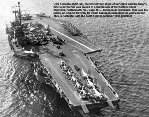
BAN: Aircraft Carrier Won't Be Buried at Sea After All
The Basel Action Network reported that the U.S. Navy will recycle the USS Forrestal and three other retired aircraft carriers.
The Basel Action Network, a global toxic trade watchdog organization, claimed victory as the U.S. Navy confirmed it had changed its decision to sink the aircraft carrier USS Forrestal, choosing instead to have the ship recycled in the United States.
BAN estimates that the recycling will save millions of taxpayer dollars and create approximately 500 green jobs in the largely Texas-based ship recycling industry.
The Navy also said it will recycle three other retired carriers: the Saratoga, Independence, and Constellation. In past years, these vessels would have been dumped at sea as artificial reefs or as part of the Navy’s sinking exercise program (SINKEX).
“The Obama Administration’s new plan to recycle these four aircraft carriers appears to be a signal that the Administration may be correcting long-standing misguided policies that not only squander resources, but American jobs as well,” said Colby Self, BAN’s Green Ship Recycling Campaign director.
BAN’s calls to the Navy to end its plans to sink the carrier began in 2008, following the Navy’s report to Congress in which the military branch clarified its intent to sink the ship as an artificial reef. By July 2009, the Navy had already spent $6.4 million removing asbestos from the vessel in preparation for ship scuttling.
BAN last year published a report, “Jobs and Dollars Overboard: The Economic Case against Dumping U.S. Naval Vessels at Sea,” which calls the Navy’s SINKEX program a significant waste of taxpayer dollars.
However, BAN remains concerned that the federal government has not stopped the plan to sink the ex-destroyer Arthur Radford next month. The ship is now under the command of a three-state artificial reefing pact comprised of Delaware, New Jersey, and Maryland. While the EPA has yet to approve the sinking, the Navy has already spent $200,000 in preparation.
Source: Basel Action Network